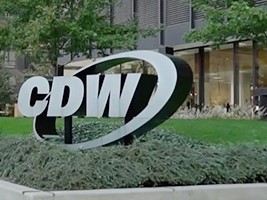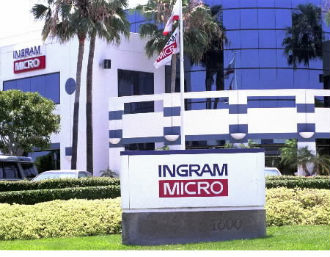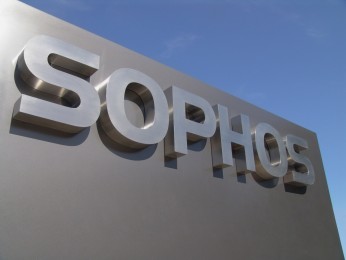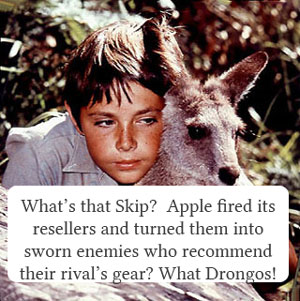 CDW has reported a record third quarter as sales neared $5 billion.
CDW has reported a record third quarter as sales neared $5 billion.
For the quarter ending 30 September, the reseller giant saw revenue climb 12.2 percent, while net income rose 9.8 per cent to just over $200 million.
 CDW has reported a record third quarter as sales neared $5 billion.
CDW has reported a record third quarter as sales neared $5 billion.
For the quarter ending 30 September, the reseller giant saw revenue climb 12.2 percent, while net income rose 9.8 per cent to just over $200 million.
 More vendors are working out ways to get their resellers at the heart of cloud based operations.
More vendors are working out ways to get their resellers at the heart of cloud based operations.
Now unified communications specialist Swyx Solutions has announced a new version of its cloud solution SwyxWare Compact for Datacentre for the channel.
The product has been designed for reseller partners, and makes it possible to take into account the individual requests of customers.
Using SwyxWare Compact, resellers and MSPs can offer cloud-based unified communications services to their customers without a huge fee.
Based on a VMware platform, the Compact version has been adapted to the needs of the channel and is aimed at partners with existing VMware knowledge.
Swyx CEO Ralf Ebbinghaus said that the SwyxWare Datacenter Edition that has been primarily offered by carriers and service providers with their own data centre.
“With the Compact version we now cover the needs of the entire channel, so any reseller can give the customer a choice for SwyxWare – on-premise or out of the cloud,” he said.
“In the last year we have given our resellers the ability, through our partner Deutsche Telekom, to offer customers a UC solution via the public cloud, and now with SwyxWare Compact we have created a further business model for our partners.”
 Lisette Sens has become head of channel at Zynstra – a new post at the startup.
Lisette Sens has become head of channel at Zynstra – a new post at the startup.
The hybrid cloud company also said it has added two resellers to its route to market – BTA Ltd and TETip Ltd, via its partner Easynet.
Zynstra is a new outfit which started in July this year but has £6 million plus in funding and is now investing in the channel.
The company targets small and medium sized enterprises (SMEs) with a hybrid cloud offering.
Zynstra co-founder and CEO Nick East said that the channel is fundamental to its business. “We needed someone with an exceptional track record and understanding of the market.”
The Zynstra Hybrid Cloud, he claimed, will give SMEs with up to 250 employees a fully managed IT system. It is sold only through the channel.
Sens said: “Working with the channel, you always want to be offering distinctive technology that solves real problems, which is exactly what Zynstra is doing. The technology means that SMEs no longer have to choose between an all-cloud approach or traditional IT, which is a very powerful message for resellers and end users.”
 Education technology group Academia is launching a new commercial business team within Academia Technology Group as a reseller for enterprise customers.
Education technology group Academia is launching a new commercial business team within Academia Technology Group as a reseller for enterprise customers.
Leading the team will be Richard Faucher, who has previously worked at PC World, Misco, Insight, and Computacenter, and has 20+ years in the IT sector. It will be branded Academia for Business.
Academia hopes to built on its reputation as an existing Apple, Toshiba, Adobe, HP, and Microsoft supplier but to expand with mainstream server and storage to help business customers.
In a statement, Faucher said account managers will focus on different markets, including publishing and media, telecoms and technology, law and finance, and sports and leisure.
 Ingram Micro has rolled out a new app designed to help Kiwi resellers respond more quickly to customer needs, while at the same time making their lives just a bit easier. The app is available for iOS and Android devices, no word on WP8 or BB10 support just yet.
Ingram Micro has rolled out a new app designed to help Kiwi resellers respond more quickly to customer needs, while at the same time making their lives just a bit easier. The app is available for iOS and Android devices, no word on WP8 or BB10 support just yet.
The apps allow resellers to access Ingram’s e-commerce offering on the go, order products and track shipments in real time, browse products, compare prices and check availability. The app also features a few clever tricks borrowed from consumerish shopping apps. For example, users can scan a bar code using a smartphone camera and the app will check the product details and Ingram Micro’s stock information, reports Reseller NZ.
The apps can also be used to impress customers, by displaying the offer on mobile devices without revealing dealer pricing, which sounds a lot more convenient than doing it on a notebook.
Ingram Micro says it will continue to upgrade the app over the coming months, but so far feedback has been largely positive. Now all they have to do is roll out similar apps tailored for other regional or national markets.
 Inspector Clouseau of the French Yard has raided Apple’s Paris headquarters on behalf of the government competition authority.
Inspector Clouseau of the French Yard has raided Apple’s Paris headquarters on behalf of the government competition authority.
French police were in the building for 24 hours seizing documents as part of an ongoing government antitrust investigation.
Investigators are interested in the relationship between Apple and its resellers in France. It was spurred by a premium reseller in France, eBizcuss, which went bankrupt last year.
According to Apple Insider the company filed a complaint against Apple accusing it of unfair competition.
According to the complaint Apple favoured its own retail stores rather than resellers like eBizcuss, which exclusively sold Apple products.
Apple made it difficult for resellers to obtain the latest models of new Apple products, while Jobs’ Mob’s cathedrals to consumerism were packed.
The French competition authority is also interested in Apple’s iOS App Store. Apple increased the minimum selling price for magazines and newspapers last year and the authority is worried that Fruity co is abusing its power for digital downloads as well.
Cupertino should have seen the writing on the wall and that it was suddenly off the French government’s Christmas card list when it was ordered to pay $6.5 million in 2011 taxes for iPad sales.
The mandate came from a French professional association that collects revenue for artists’ copyrighted works.
 Reseller hosting company Heart Internet is offering an unlimited Reseller Pro package for three months free
Reseller hosting company Heart Internet is offering an unlimited Reseller Pro package for three months free
Many creative agencies and sole traders use reseller hosting to supplement their income and build develop long lasting relationships with their clients.
But that particular industry is pretty rubbish at the moment because prices are falling due to increased co-operation.
Heart Internet director Jonathan Brealey said that Heart thinks that by doing some deals of its own, it can help out.
Research conducted by Heart Internet has shown that web designers are offering on average more than three additional services to their clients, including website management, web hosting and SEO in order to increase revenue.
By offering cost cutting packages, Brealey thinks that the web design companies could save £100 for each customer.
Brealey said that selling web hosting is a great way to ensure recurring revenue and build long lasting relationships with your clients, and with this offer, there has never been a better time to start.
“We have worked hard to make our reseller package the best in the UK and we are committed to continuously improving it so that our customers can provide a high quality web hosting service for their clients,” he said.
 Infoblox and its Wipro owned chum Infotech have announced a global reseller arrangement claimed to give businesses and public organisations greater control over their corporate IT networks
Infoblox and its Wipro owned chum Infotech have announced a global reseller arrangement claimed to give businesses and public organisations greater control over their corporate IT networks
The pair have said that the move is as a result of a “changing landscape” and the increasing demands put on networks by mobile devices and bring-your-own-device programs. Virtualisation and private clouds, as well as the transition to IPv6 were also claimed to have created greater complexity and risk for IT teams to manage.
Through this reseller deal, Wipro will use Infoblox’s technology to help its customers automate network control functions like DNS, DHCP and IPAM to cut complexity and costs, increase security and stay uptime longer.
This will be done through Infobloxs’ services for discovery, real-time configuration and change management, and compliance for the control plane – the layer in between infrastructure like switches and routers, and applications and endpoints like IP phones or virtual machines.
It said this would help IT teams as instead of adding manual processes and increasing network bandwidth, they could “more efficiently” control their networks, and free up resources to focus on strategic projects that create business value.
 New broom at insecurity outfit Sophos, Michael Valentine, has warned that he plans to shake up the company’s channel, just 24 hours after he first put his bottom on his seat.
New broom at insecurity outfit Sophos, Michael Valentine, has warned that he plans to shake up the company’s channel, just 24 hours after he first put his bottom on his seat.
Valentine has just started his job as Sophos’ senior veep and will manage the global channel programme. He wants to apply his own philosophy to the company’s channel, with subtle changes aimed at reigniting business, particularly in the US and Canada.
He thinks that Sophos needs to attract new partners, particularly if it wants to get money out of the US which has been a lacklustre market.
Talking to CRN in the US, Valentine said that the North American space is where Sophos was doing the least amount of business, and the gap is absolutely huge. Sophos has the product set and the new management allowed to run it and it needs an enriched channel program, he claimed.
In addition to antivirus software, Sophos’ endpoint security platform provides software for encryption, vulnerability monitoring, data loss prevention and mobile device management. It also has unified threat management appliances and firewalls to sell following the acquisition of Astaro in 2011.
Valentine said it was too early to provide any details on changes to the Sophos partner program, but he wants to strengthening Sophos’ three-tiered program with additional support and attention to partners.
This will be yet another shake-up for the Sophos Solution Provider Partner Programme which was rejigged under Emmanuelle Skala, vice president of global channels. There is also a new redesigned partner portal also provides deal registration, product and promotion information.
 Resellers trying to peddle insurance along with hardware packages might find themselves in hot water because the insurance industry has a problem identifying its customers.
Resellers trying to peddle insurance along with hardware packages might find themselves in hot water because the insurance industry has a problem identifying its customers.
Analyst outfit Ovum said that insurance companies are badly informed when it comes to working out who their customers are as the whole industry is getting turned on its head by new technology.
New research from the analysts highlights how the insurance sector is trying to adapt to new models of commerce and some are falling behind.
An Ovum spokesperson said that insurance is moving from a model where one-to-many messaging works, particularly in mass media, to a framework where consumers are gaining more power in the business transaction.
This means that insurance companies are designing packages which do not meet the needs of consumers and if they are being sold as part of a reseller, or warranty package, then it will the IT company that gets hit by the backlash.
Ovum believes that until insurers understand who the customer is, they will be unable to shape, deliver, and strengthen the experience each customer expects. It thinks that insurers, and those who are peddling it, must ensure that marketing is tailored to each individual customer as closely as possible.
Barry Rabkin, principal analyst, Insurance Technology warned that the insurance industry was headed towards a competitive myopia.
He said that customer experiences were becoming the basis of competition in the insurance industry and companies need to encompass customer needs, expectations, and satisfaction into their customer experience management (CEM) strategy.
Bad experiences were also more likely to be communicated thanks to the spread of mobile technology and users who are more informed and interconnected people who are seeking advice from each other.
If a reseller does not closely monitor their insurance packages to make sure they are what their customers think they are getting, it could be their brand that suffers. Customers are more likely to blame the company they bought the package from, before they moan about the insurance.
Resellers have to offer more personalised insurance packages rather than hoping that one size will fit all.
Insurers and the companies that repackage their products must quickly weave in the importance of customer experience into the company strategy at each touch point in order to succeed or fail to meet their expectations, Rabkin said.
 Software giant Microsoft is trying to encourage its channel to come up with more cloud offerings by cutting the price on its Azure licencing.
Software giant Microsoft is trying to encourage its channel to come up with more cloud offerings by cutting the price on its Azure licencing.
Microsoft lowered Windows Azure price on SQL Reporting Services, which is used for business intelligence-type applications.
The SQL Reporting Service is now measured at increments of 30 reports at $0.16 per hour. The previous charge was measured at $0.88 per hour in increments of 200 reports.
Writing in its bog Vole claims that “the smaller report increment will give customers better use of the service and lower effective price points”.
Like most of the postings that Microsoft has made on its cloud offerings this one is as clear as mud. That is one of the things that resellers have been moaning about when it comes to Azure. The licensing arrangements are so Byzantine you have to be Constantine the Great to understand how they all work.
Customers have to pay for the compute time, data storage and data access and the bandwidth of the data transferred out of the cloud. Those various services get priced per GB. Then there is a monthly fee rolled into the overall cost if an organization uses SQL Azure.
To make matters worse, at the end of last year, Vole started reducing the price for Windows Azure Storage (WAS), claiming that costs could be reduced by 28 percent. WAS offers geo-replication storage support, as well as lower cost “redundant storage”. The geo-replication storage service is turned on by default.
However according to RPC magazine the service cannot be that good because when there was a two-day Windows Azure service disruption in December, Vole did not bother using it. If it had, Microsoft would have lost customer data.
Microsoft is apparently planning a few price more cuts which look even more complex as they are discounts based on spending tiers.
All this is because of the effectiveness of Amazon, particularly Amazon Elastic Cloud Compute (EC2) and Amazon Web Services (AWS). Amazon cut data transfer prices by as much as 83 percent. In addition, Amazon decreased some EC2 on-demand prices by up to 13 percent.
All up this is making the life of the reseller trying to sell Azure based offerings a little harder. Price cuts would make things a lot more competitive, if the original pricing structure was not so complex. Trying to sell such a complex structure to a client is a tough sell, particularly when the customer does not know what they are getting into.
 Apple might have scored an own goal down-under by culling its channel savagely and pushing its own retail model.
Apple might have scored an own goal down-under by culling its channel savagely and pushing its own retail model.
Last year, Apple fired more than 200 Australian resellers. Many of them had been selling Apple gear for years. The sackings came without warning or explanation.
One Sydney reseller told CRN Australia that all he got was a two line email terminating his reseller status. It ended his connection to Apple which brought $5 million worth goods to Australian businesses, health organisations and not-for-profits.
Another reseller who was dropped from Apple’s list was Sydney reseller Complete PC Solutions. Director Frank Triantafyllou said Apple made up figures which claimed his outfit had not sold enough products. Not only was that untrue, but what he found was that Apple was not really behaving like a partner.
His company often found he was competing against Apple’s own sales team and would find that product was not being made available for him to sell.
In one case he wanted 100 iPads for a school customer but was told by Apple he wasn’t authorised to supply that particular product.
The feeling down under is that Apple has peaked and it is losing business opportunities because it can’t handle the channel. The reason it can’t handle its channel is because it can’t give up control.
Apple’s policy appears to be one of forcing customers to go direct. This is helped by the development of its own retail channel. While this boosts the company at a local level it means the loss of huge numbers of sales.
Apple also failed to notice that those 200 resellers suddenly turned from committed advocates to actively hostile competition.
What the resellers have done is to recommend to their installed base of customers products which are not blessed by Apple. Talking up the merits of rival products seems to be working.
For example, HP’s ElitePad business tablet is being pushed for having a number of superior features for businesses, including better touch control, better keyboard, battery life, faster processing and of course Windows 8 and Flash compatibility.
Instead of pushing Apple, they have established an idea, which we are seeing among Apple resellers in Europe too, that Apple is a spent force.
One Roman reseller, which had been a keen Apple supplier for a decade, said that he started recommending other products because Apple’s time was over.
“It used to be that Apple was seen as infallible, and perhaps under Steve Jobs it was, but now cracks are appearing,” he told ChannelEye. “We could have put up with them being arrogant before, but now it is just annoying.”